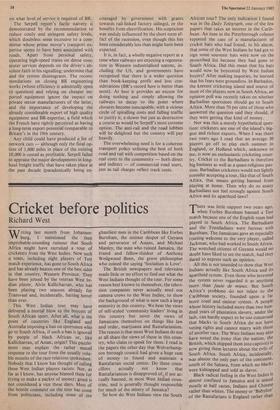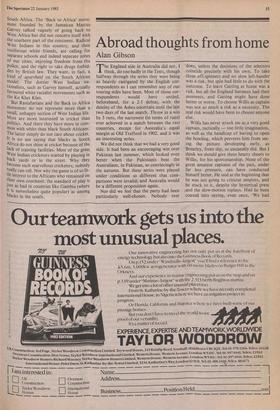Cricket before politics
Richard West
Writing last month from Johannes- burg, I mentioned the then improbable-sounding rumour that South Africa might have recruited a tour of cricketers from the West Indies. Now such a team, including eight players of Test match experience, has gone to South Africa and has already beaten one of the best sides in that country, Western Province. They have been joined by the veteran West In- dian player, Alvin Kallicharran, who has been playing two seasons already for Transvaal and, incidentally, batting better than ever.
This West Indian tour may have delivered a mortal blow to the boycott of South African sport. After all, what is the point of countries like England and Australia imposing a ban on sportsmen who go to South Africa, if such a ban is ignored by people of black African or, like Kallicharran, of Asian, origin? This puzzle- ment may explain the rather muted response to the tour from the usually volu- ble mouths of the race relations spokesmen. Nobody that I know has thought of calling these West Indian players racists. Nor, as far as I know, has anyone blamed them for trying to make a packet of money; greed is not considered a vice these days. Most of the hostile comment on the tour has come from politicians, including some of the ghastliest men in the Caribbean like Forbes Burnham, the sinister despot of Guyana and persecutor of Asians, and Michael Manley, the man who ruined Jamaica, the friend and fellow-thinker of Anthony Wedgwood Benn, the grave philosopher who coined the saying 'Socialism is Love'.
The British newspapers and television made little or no effort to find out what the West Indians thought of the tour. For some reason best known to themselves, the televi- sion companies never actually send out camera crews to the West Indies, to show the background of what is now such a large minority in this country. We hear the views of self-styled 'community leaders' living in this country but never the views of Jamaicans themselves on things like law and order, marijuana and Rastafarianism. The reason is that most West Indians do not at all share the views of those in this coun- try, who claim to speak for them. I read in the papers the other day that Wolverhamp- ton borough council had given a huge sum of money to found and maintain a Rastafarian social centre. Do these coun- cillors actually not know that Rastafarianism is disapproved of, if not ac- tually banned, in most West Indian coun- tries, and is generally thought responsible for much of the misery of Jamaica?
So how do West Indians view the South
African tour? The only indication I found was in the Daily Telegraph, one of the few papers that takes an interest in the Carib- bean. An item in the Peterborough column reported the case of a manufacturer of cricket bats who had found, to his alarm, that some of the West Indians he had got to sign some souvenir bats were now on the proscribed list because they had gone to South Africa. Did this mean that his bats would now be boycotted by West Indian buyers? After making inquiries, he learned that his fears were groundless. In Barbados, the keenest cricketing island and source of most of the players now in South Africa, an opinion poll was recently taken on whether Barbadian sportsmen should go to South Africa. More than 70 per cent of those who answered the question said they should, if they were getting that kind of money.
Nor was this a merely hypothetical ques- tion: cricketers are one of the island's big- gest and richest exports. When I was there two years ago I read that an average 30 players go off to play each summer in England, or Holland which, unknown to me, is now an enthusiastic cricketing coun- try. Cricket to the Barbadians is therefore big business as well as a quasi-religious pas- sion. Barbadian cricketers would not lightly consider accepting a tour, like that of South Africa, that means getting banned from playing at home. Then why do so many Barbadians not feel strongly against South Africa and its apartheid laws?
'There was little support two years ago, 1 when Forbes Burnham banned a Test match because one of the English team had played in South Africa. The Barbadians and the Trinidadians were furious with Burnham. The Jamaicans gave an especially rousing welcome to the very player, called. Jackman, who had worked in South Africa. The wretched citizens of Guyana would no doubt have liked to see the match, had they dared to express such an opinion.
All this is not intended to show that West Indians actually like South Africa and its apartheid system. Even those who invented the system never regarded it as anything more .than faute de mieux. But South Africa's problems do not relate to the Caribbean society, founded upon a far more cruel and sinister system. A people whose history included more than two hun- dred years of plantation slavery, under the lash, can hardly expect to be too concerned that blacks in South Africa do not have voting rights and cannot marry with those of another race. The West Indians may also have noted the irony that the nation, the British, which shipped them into captivity is now giving them lectures about the evils of South Africa. South Africa, incidentally, was almost the only part of the continent, south of the Sahara, from which no blacks were kidnapped and sold as slaves.
Black radical feeling in the West Indies is almost confined to Jamaica and is aimed mostly at half castes, Indians and Chinese, rather than whites. The enemy or 'Babylon of the Rastafarians is England rather than South Africa. The 'Back to Africa' move- ment founded by the Jamaican Marcus Garvey talked vaguely of going back to West Africa but did not concern itself with the southern part of the continent. Radical West Indians in this country, and their vociferous white friends, are calling for separate schools and indeed separate zones of our cities, enjoying freedom from the police, and the right to take drugs forbid- den by British law. They want, in fact, a kind of apartheid on the South African model. The dottier West Indian na- tionalists, such as Garvey himself, actually favoured white racialist movements such as the Ku Klux Klan.
But Rastafarians and the Back to Africa movement do not represent more than a small, unhappy section of West Indian life. Most are more interested in cricket than Politics. And there they have more in com- mon with white than black South Africans. The latter simply do not care about cricket. It is no use saying that blacks in South Africa do not shine at cricket because of the lack of training facilities. Most of the great West Indian cricketers started by playing in back yards or in the street. Why they become such marvellous cricketers, nobody really can tell. Nor why the game is of so lit- tle interest to the Africans who remained on their own continent: the standard of play is just as bad in countries like Gambia (where it is nevertheless quite popular) as among blacks in the south.







































 Previous page
Previous page